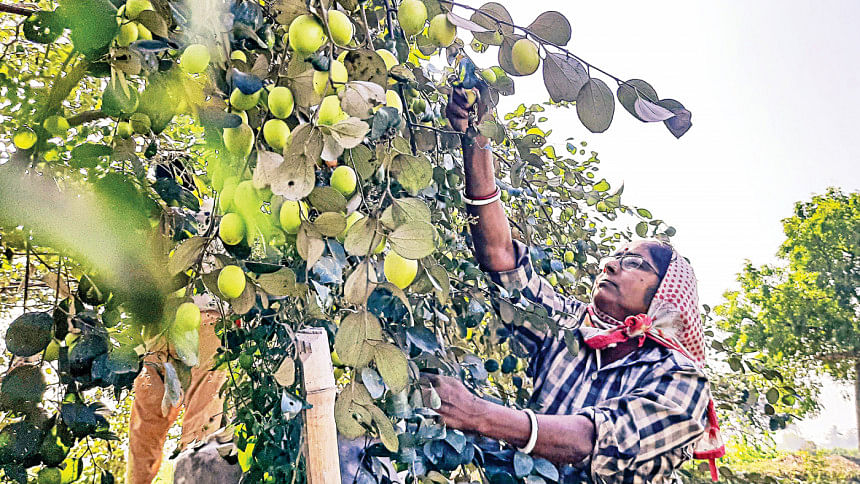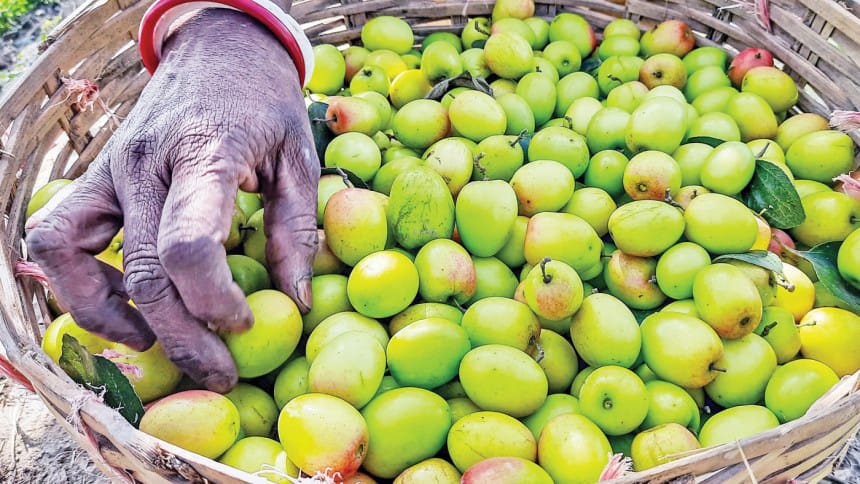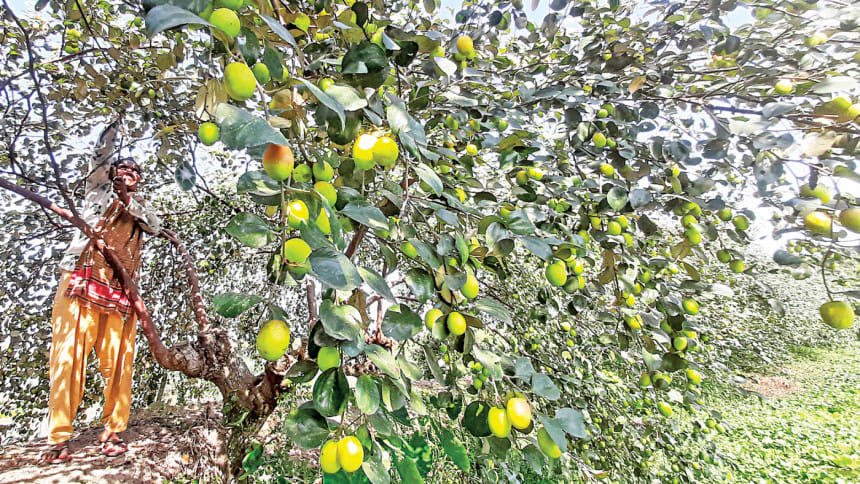Jujube cultivation gaining ground

Thousands of farmers in the southwestern region of Bangladesh are benefitting from cultivating jujube as the fruit offers better profits within a shorter period of time compared to other crops.
As a result, jujube cultivation is gaining ground in the region, especially in Satkhira, Khulna and Bagerhat, where most farmers once focused on shrimp or vegetables that are more suited to the saline prone soil.
Now, at least 15,000 jujube farmers are conducting trade worth Tk 200 crore with Satkhira being the biggest growing district.
Punjab Ali Biswas, a resident of the Bhairabnagar area under Tala upazila of Satkhira, has been cultivating jujube on a commercial basis for the past nine years.
Biswas, who previously worked as a day labourer, cultivated 420 trees of six varieties of jujube on eight bighas of land in the current season, which began in early November.
"I sell up to Tk 13 lakh worth of jujube each year," he said, adding that he has already sold Tk 6 lakh worth of the fruit so far.
Biswas sold jujube for as much as Tk 150 per kilogramme (kg) at the beginning of the season, but the price has since dropped to Tk 75 to Tk 80 per kg depending on quality and size.
All in all, the farmer has to spend about Tk 6.5 lakh every year on the required land lease, irrigation, fertiliser, pesticide and wages.
Jujube cultivation was made possible by the construction of dikes and subsequent development of polders have improved water drainage in the area. As a result, inundation has reduced, allowing farmers to increase the variety and quantity of cultivation.
While visiting different upazilas of Satkhira, this correspondent found that many farmers were busy harvesting and sorting their jujubes while wholesales were seeking suppliers.
On a single day, at least 25 trucks bound for different parts of the country were seen waiting to be loaded with jujubes at Patkelghata bazaar.

The jujube market in Satkhira alone amounts to about Tk 120 crore as the regions soil and climate are conducive to the fruit.
The jujubes grown in the district are shipped all over Bangladesh, including Dhaka, Barishal and Chattogram.
At least 40 per cent of the jujube plantations in the region sprung up over just the past three years.
Now, around 15,000 tonnes of the fruit are produced annually in Satkhira alone, according to sources at the local Department of Agricultural Extension (DAE).
This year, 795 hectares of land across seven upazilas of the district are being used to grow jujube while it was 665 hectares in 2022.
In Bagerhat, 335 hectares have been brought under jujube cultivation while it is 89 hectares in Narail and 530 hectares in Khulna. Each variety of jujube yields an average of 10 to 15 tonnes of fruit per hectare.
Shahajan Ali, a farmer of Shobna union under Dumuria upazila in Khulna, said he cultivated the Ball Sundari, Bharti Sundari, Ninety and Mishti Kul varieties on four bighas of land this year.

"I have sold Tk 2 lakh so far. We are selling the fruit at a wholesale price of Tk 3000 to Tk 3,500 per maund [37 kgs]. Wholesalers from different places come and buy from my orchard," he said.
"If there is no natural disaster, I can sell two species from four bighas of land for as much as Tk 6.50 lakh," Ali added.
He went on to say that while many farmers what to export their produce, they lack sufficient opportunities in this regard.
Rasel Hossain, the owner of Khulna's Messrs Mita Banijya Bhandar, said the demand for Satkhira's jujubes is very high.
Apart from Khulna city, he has supplied the fruit to traders in Barguna, Patuakhali, Madaripur, Barishal and Pirojpur.
"We buy the fruit at a wholesale rate of Tk 3,500 to Tk 3,700 per maund," Hossain said, adding that his company buys up to 8,000 maunds of jujube every season.
Dr Md Zamal Uddin, deputy director of the Satkhira DAE, said farmers are very interested in cultivating the fruit. Besides, fish farmers are also benefiting by cultivating it around their shrimp enclosures.
"Many advanced varieties of jujube are being cultivated in the district. Around 16,000 tonnes of the fruit are produced annually. As such, the average market size is worth more than Tk 120 crore," he said.
"If the yield is good, the profit is more than Tk 2 lakh per bigha excluding the cost," Uddin added.
Md Faridul Hassan, assistant director of the Khulna DAE, said commercial jujube cultivation in the region is increasing day by day.
"Now, we need to follow the proper process to begin exports," he added.
Hassan went on to say that the government has been trying to initiate exports through various means.
"We are trying to ensure cultivation by applying better farming methods by training the farmers more," he said.
"Already, the process of setting up a vapor heat treatment plant is going on. Through this method of disinfection and preservation, the fruit can be sent abroad," Hassan added.

 For all latest news, follow The Daily Star's Google News channel.
For all latest news, follow The Daily Star's Google News channel. 




Comments